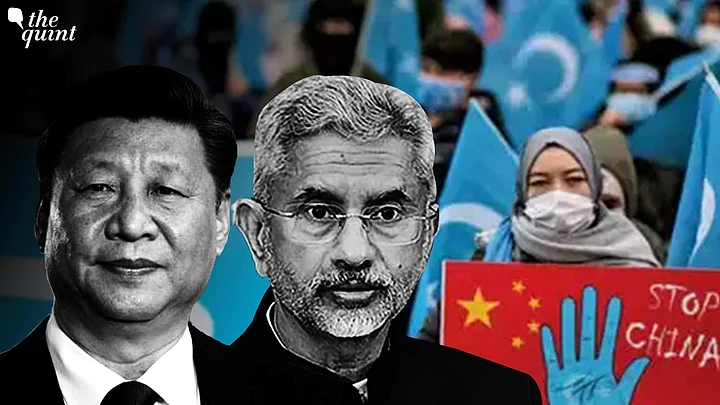In what observers say is a diplomatic victory for China, the UN Human Rights Council (UNHRC )voted down a US-proposed draft resolution calling for debate on the human rights situation in its Xinjiang province.
Nineteen countries including China voted to reject the proposal while 17 were in its favour and 11 countries including India, abstained. Significantly, several Muslim-majority countries voted along with China
The resolution was the outcome of a report from the outgoing UN Human Rights Chief Michelle Bachelet released on her last working day on 31 August which found that “crimes against humanity” may have occurred in Xinjiang. A lot of the damning information used in the report was from Chinese official sources.
India’s Diplomatic Stand on Human Rights
India’s position at the UNHRC is part realpolitik and part principle though South Block officials claim that New Delhi makes it a practice not to vote on country-specific resolutions at the 47-member UNHRC. But it does so, not out of high principle but the practical dictum of doing unto others as they do unto you.
India’s own observance of human rights practices is not particularly notable. In 2018, a UNHRC report that looked at both the Indian and Pakistan-controlled Kashmir called for international inquiry into multiple violations of human rights there.
In 2021, in her statement to the UNHRC meeting in Geneva, Bachelet criticised India on account of the use of The Unlawful Activities (Prevention) Amendment Act (UAPA), pressure on journalists and frequent blackouts in J & K. She has also criticised China’s refusal to allow her access to Xinjiang.
The 2021 US State Department report on India in relation to human rights talked of “Significant human rights issues including credible reports of unlawful arbitrary killings…torture… arbitrary arrest and detention by government authorities; political prisoners or detainees…violence, threats of violence, or unjustified arrests or prosecutions against journalists….”
China Has Allies' Back on Xinjiang Issue
For this reason, the government deems it prudent not to allow discussions on human rights issues when it comes to excesses, whether it relates to China, or for that matter, Sri Lanka. In the current meeting of the UNHRC, the resolution on Sri Lanka was accepted by a vote of 20 in favour and 7 against.
India was among the 20 countries who abstained. Pakistan and China, significantly voted “no” on the resolution that called for promoting reconciliation and accountability and human rights in Sri Lanka.
China got significant support for its position from the Global South but this was a narrow victory as 17 countries supported the resolution and 11, including India, Ukraine and Malaysia abstained. Chinese diplomacy was successful in locking the support of its usual allies, as well as many African countries.
Significantly, Nepal backed China. Not surprisingly, given the politics around the issues, Muslim countries like Indonesia, Sudan, Pakistan, Kazakhstan, Qatar and UAE backed China. The Organisation of Islamic States (OIC) which has periodically criticised India on Kashmir, or the treatment of the Rohingyas and Palestinians, has been silent on the issue of Xinjiang.
What Guides Global Geo-Political Stand?
Earlier this year, Chinese Foreign Minister Wang Yi was even invited as a special guest to attend the 48th session of the OIC Council of Foreign Ministers that was held in Islamabad.
Despite its name, the UNHRC established by the UN General Assembly in 2006, is more of a political body than anything else. The positions taken by various countries are based on their larger geopolitical calculations, rather than any concern for human rights observance.
That is the reason why India and Ukraine abstained. The latter has no love lost for China but feels it prudent not to needle it unnecessarily.
The 47 members of the UNHRC are elected every two years on a regional bloc basis and it meets twice a year in Geneva.
In April, the UNGA voted to suspend Russia from the UNHRC for gross and “systematic violations and abuses of human rights” in its invasion of Ukraine and at that time, too, India had abstained in a vote where 98 countries voted in favour, 24 against and 58 abstained.
Did India Play Safe at the Humanitarian Front?
New Delhi was cautious in its approach to the report and the UNHRC deliberations. With its own relations with China on a knife’s edge, it did not want to do anything that would appear to attack China.
The South Block probably calculated that India’s posture would mildly irritate the Western countries, and stood in no danger of alienating Muslim countries, considering the way prominent Muslim-majority countries voted.
Whatever be the outcome of discussions in UN bodies or elsewhere, the reality is that the Uighurs are suffering unprecedented repression in Xinjiang, This fact has not only been documented by Bachelet’s report but also come out through other sources as well. More than 1 million Uighurs are in detention camps of one kind or another. There have also been charges that they have been forced to labour in farms and factories in this period.
The Chinese seem determined to Sinicise the Uighurs and the Tibetans. More than half of Xinjiang’s 25 million population comprise Uighurs. On the other hand, given its more difficult terrain, there are just about 2.6 million Tibetans in the Tibet Autonomous Region (TAR) who are not currently seen as much of a threat as the Uighurs.
Following the vote, China’s foreign ministry issued a statement charging the US and western countries for misleading the world about the situation in Xinjiang and using the human rights issue to attack China. It said that the UNHRC should focus on human rights violations relating to the US, UK and other western countries in relation to racism, violent gun violence, massive killings of civilians in overseas military ventures.
(The writer is a Distinguished Fellow, Observer Research Foundation, New Delhi. This is an opinion article and the views expressed are the author's own. The Quint neither endorses nor is responsible for them.)
